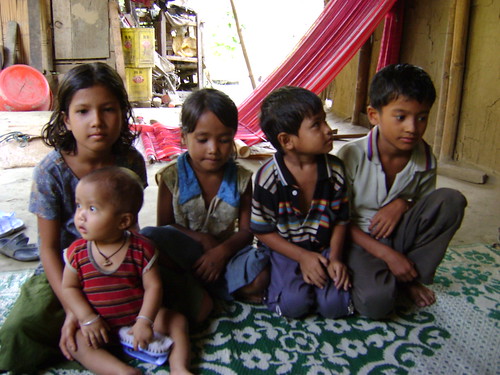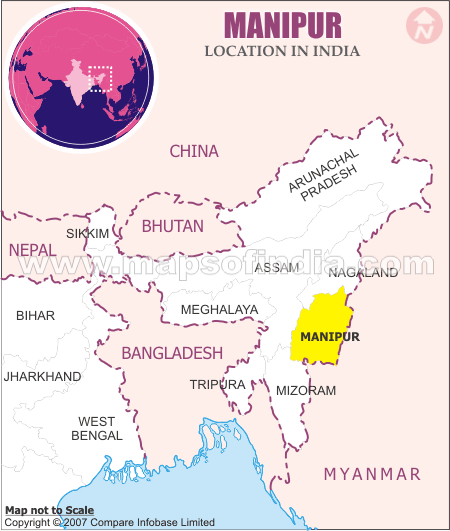Muslims who are also called Pangal in local terminology came to the Manipuri region in the late 16th or early 17th century. They are also called Meitei-Pangal which means indigenized and acculturated or simply Manipuri Muslims. They settled in this land earlier than many other communities.
They have since remained part and parcel of Manipuri society. They were very much part of the various ups and downs witnessed by the region, as it evolved from its tribal nature to its present status.

As per the Census 2001 Muslims constitute 7% of the total population of the state. They are settled in different pockets such as Lilong, Yairipok, Sangaiyumpham, Kshetrigao, Moirang, Mayang Imphal, Thoubal, Bishenpur, Chandel and Churachandpur. A section of the Muslims in the state also are migrants from Bihar and UP.
The present socio-economic condition of the Pangals or Muslims in Manipur is pathetic. At least this is what one concludes from the statistics provided by the All-Manipur Muslim United Coordinating Committee (AMMUCOC), a Muslim representative body in the state.
According to the Muslim body, the literacy rate among Muslims is 58.6 percent (male 75 percent and female 41.6 percent) much below the state’s average of 70.5 percent (male 80.3 percent and female 60.5 percent).
Out of 1,35,000 people (the Muslim population in the state ) by the end of the year 1995 there were only 5,704 matriculates, 1,822 graduates in addition to 86 technical and professional graduates.
There are only 51 Class I Muslim officers including three women, 101 Class II officers and 1,270 and 1,663 employees belonging to Class III and IV categories respectively.
At the root of their pathetic condition, as the community leaders feel, is the fact that the successive governments have done nothing worthwhile to uplift the community educationally and economically.
It is evident from the fact that the twenty-nine officially recognized tribal groups have 20-seats exclusively reserved for them in the 60-member Manipur state assembly and up to 31 percent reservation in all government jobs.
But by contrast Muslims have been forced to recoil in their own ghettos without any kind of help from the government.
Although in December 2006 Chief Minister Okram Ibobi Singh did announce a four percent reservation policy for the Muslim community in government jobs. But this half hearted announcement hasn't bore satisfactory results.
Their subhuman living condition is characterized by ethnic rivalry. Rivalry between Pangals and Meiteis.
Meiteis are the privileged majority community of the state. They are the most educated and economically well-off community. The clash between them and the Pangals (Muslims) in 1993 is one of the well etched communal scars in the history of Muslims in the state.

TCN talked to Sitara Begum, President of All Manipur Muslims Women Development Organization (AIMMWDO). According to her it started due to wild rumors and misunderstanding between Meiteis and Meitei Muslims.
Although an altercation did take place between the Muslim groups and the Meitei youths belonging to People's Republican Army (PRA), the neighboring Meitei villagers spread the rumors of molestation of some Meitei girls by the Meitei Muslims.
In the riot which followed the rumors, 150 Muslims and 4 Meiteis died in the valley districts and 149 were injured. One hundred and one cases were registered by the police and 423 persons arrested in connection with the incident.
Fortunately, it ended abruptly though healing of wounds took a bit long.
And it is because of this fight between two unequal groups that according to Institute of Peace & Conflict Studies, North East India, militant Muslim groups like the People's United Liberation Front (PULF), Islamic Revolutionary Front (IRF), Islamic National Front (INF), United Islamic Revolutionary Army (UIRA) and United Islamic Liberation Army (UILA) came into existence in Manipur to protect their communities after the Meitei-Pangal clash that took 150 Muslim lives in 1993.
TCN talked to Azimuddin Choudhary, about the socio-economic conditions of the Muslims in the state. Mr. Choudhary is the General Secretary of Markaz Maarif and also runs a madarsa in Lolang.
He too expressed concern over pathetic socio-economic condition of the Muslims in the state. He stressed that they are in urgent need of quality education and economic empowerment.
So it is high time that the government must take concrete measures to ensure fair participation of Muslims in the economic and social mainstream. Otherwise the day is not far when they will be reduced to non-entity.
(With inputs from Delhi-based journalist Md. Ali)
Link:
http://en.wikipedia.org/wiki/Meitei_people#External_links
http://en.wikipedia.org/wiki/Pangal#External_links
